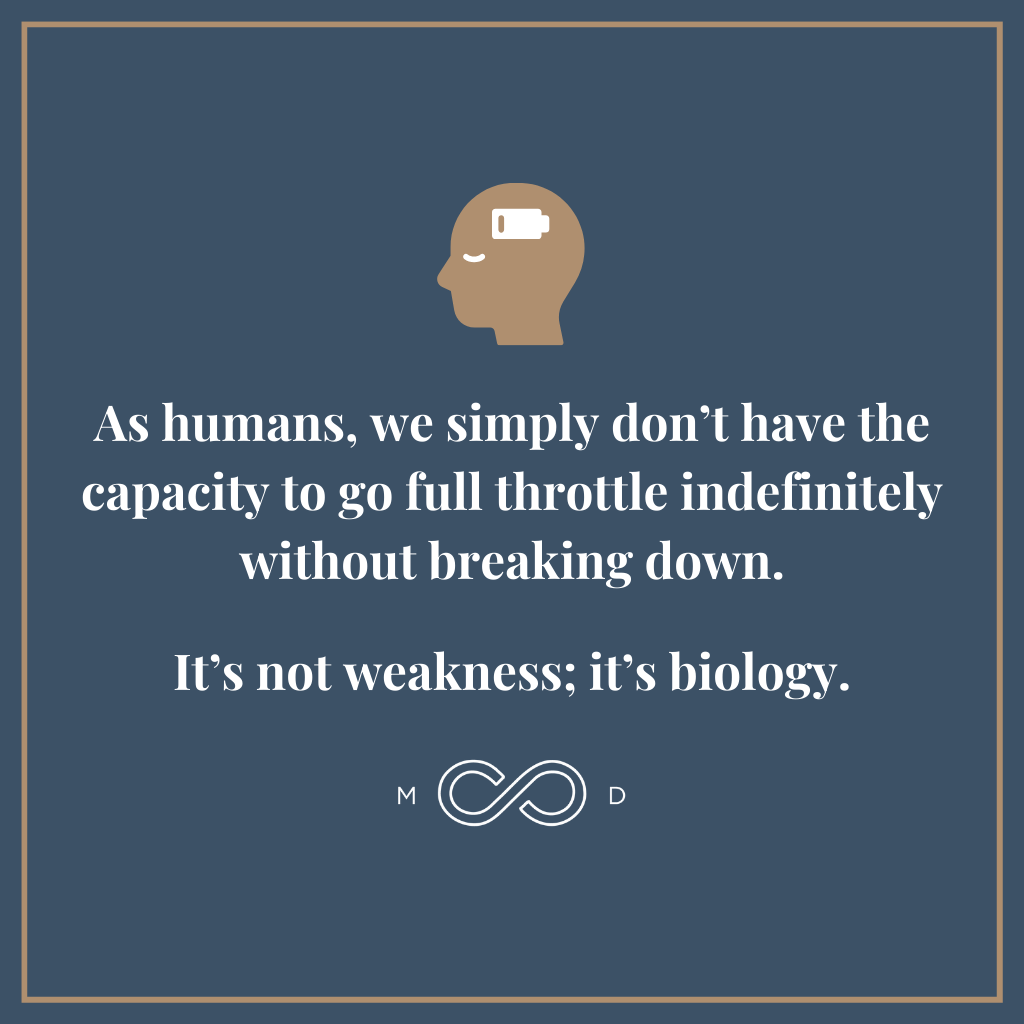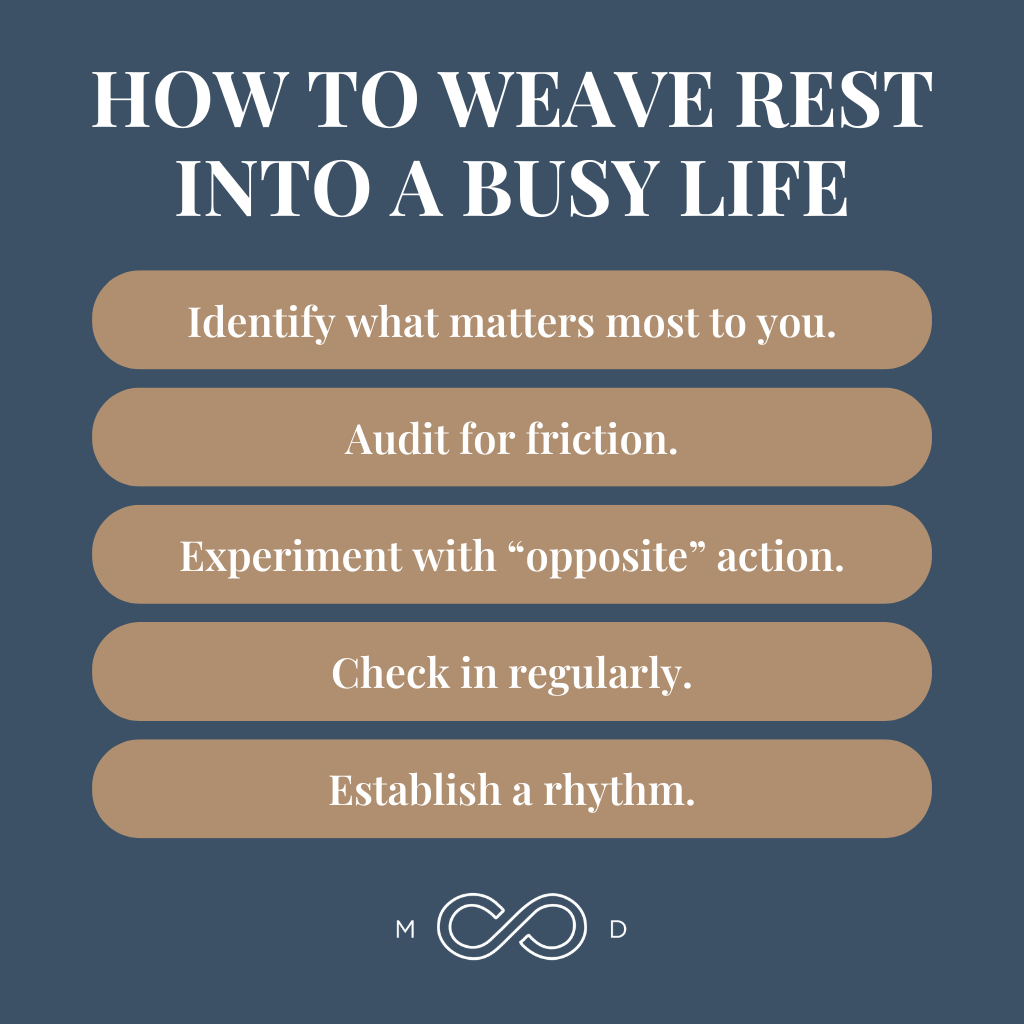We live in a society that glorifies the grind, carting around tired eyes and caffeine like badges of honor.
I started noticing this mentality back in medical school, where classmates loved to wax eloquent about how little sleep they got. I’d never heard of bragging about lack of sleep before; it was a new concept to me.
After years in academics, medicine, and business, the phenomenon became less mystifying. As a doctor to high-achievers in an achievement-oriented society, I’ve seen firsthand how many of us struggle with the concept of rest.
The truth is, even when we intellectually understand the importance of rest, many of us have a hard time figuring out how to rest in practice. Why is that? And what can we do about it?
In order to change our behavior, we first need to change our mindset. So, let’s start by digging into our collective mythology about rest and why falling for it can be costly.
The Myth of Productivity at All Costs
In our culture, it’s not surprising that we extrapolate sacrificing rest as the path to success.
Moments of great achievement often require an intense investment of time and energy. We’ve all been there — pulling all-nighters to cram for an exam, working overtime to close a deal, or burning the midnight oil to launch a new project. And the success that stems from these moments tempts us to believe that this is what it takes to reach our goals.
Consequently, it’s often the most talented, the most skilled, and the most successful who are seduced by the sacrifice of sleep. The marketplace itself rewards this approach. Put in more hours, close more deals, hit those targets — sleep can wait, right?
Except it can’t. At least, not indefinitely.
If you’re young and otherwise healthy, your body might let you believe you can rest later. You can rally after a lack of sleep with few consequences. You can tell yourself rest is just around the corner.
The problem? The corner never seems to come.
Here’s where we go wrong: We mistakenly conclude that constant grinding is the ONLY way to achieve success. We buy into the myth that rest is a luxury we can’t afford, rather than a necessity for sustained performance.
The problem with this mentality is that it isn’t sustainable. Yes, there are absolutely times when we need to sacrifice, to put other priorities on the back burner in service of an important goal. But when we extrapolate that occasional sacrifice into a way of life, assuming all good things come from not resting, we get into trouble.
As humans, we simply don’t have the capacity to go full throttle indefinitely without breaking down. It’s not weakness; it’s biology.
The stress of the grind puts our bodies into a constant fight-or-flight state. The problem? We were never meant to run from grizzly bears forever. We can’t continually operate at peak intensity without giving our bodies and minds a chance to recover.
When Short-Term Gains Lead to Long-Term Pains
Many of us can power through the short-term consequences of missed sleep, especially when we’re young. Determination, grit, and lots of caffeine can propel us through tired, grumpy, brain-foggy days.
But ignoring the short-term effects of sleep deprivation doesn’t mean the consequences don’t exist. These short-term effects are your body’s early warning system, alerting you that your biology isn’t happy. And you can only hit snooze for so long before short-term inconveniences translate into long-term problems.
I speak from experience. When I first started my business, I allowed myself to believe I was too busy to work out. I didn’t notice any big issues after a week or a month. But after four years snuck by, I’d put on 40 pounds of fat.
The problem with neglecting rest is that the consequences are subtle and slow to surface. They don’t slap you in the face like a hangover after a night of too many drinks. They accumulate quietly in the background, easy to ignore — until the day you realize you’ve got a real problem on your hands.
It’s all too easy to ignore the alarm bells until it’s too late. We think we’re being tough, pushing through the fatigue, when in reality we’re setting ourselves up for burnout, chronic stress, and a host of physical and mental health problems.

The Cost of the Grind
Many high-achievers are so used to running on fumes that they don’t even realize how much it impacts their quality of life. They think they’re managing, until suddenly they’re not.
Our bodies have a way of getting our attention when we ignore their needs for too long. It might start with a few extra pounds around the middle, or a nagging sense of irritability and overwhelm. But over time, the consequences of chronic stress and sleep deprivation can be far more serious.
We’re talking about increased risk of heart disease, diabetes, depression, anxiety — the list goes on. And that’s not even touching on the toll it takes on our relationships, personal lives, and overall well-being.
When we continually miss sleep, we suffer consequences that can interfere with success — impaired memory, dysregulated emotions, and reduced cognitive function, to name a few. We shortcut our brain’s incredible ability to sort, store, and purge memories and emotions of the previous day — all a function of adequate sleep — and drag yesterday’s problems into today.
In turn, we become vulnerable to a host of non-ideal behaviors to cope with our overworked state.
For some, maybe it’s caffeinated drinks throughout the day or an extra glass of wine each night to “unwind.” Or maybe it’s mindless scrolling through social media when you have a spare minute. These behaviors crop up when we’re depleted and disconnected from our deeper needs, and — over time — they can impact our health, our relationships, and the very success we sacrificed for in the first place.
Running on Empty, Headed for Burnout
Human beings simply don’t have the capacity to infinitely adapt to inadequate rest.
It’s something like phone batteries. Say your phone takes two hours to charge to 100% at night. One day, though, you only leave it on for part of the time, getting the charge to 80%. The phone still works without trouble, and everything seems fine.
But that night, you only charge it for the same fraction of time again. Your phone has adequate power to work the next day, but if you follow the same pattern, it’ll eventually run out of battery.
A similar principle applies to rest. If we never allow ourselves to fully recharge, we’ll eventually hit a wall. On top of that, we’re not machines. We do function differently on reduced power.
When we don’t allow ourselves to fully recharge on a regular basis, we put a limit on our ability to show up as our best selves. We become less resilient, less creative, and less able to handle stress and navigate challenges. Our brain isn’t the freshly prepared “blank canvas” we need for taking on and absorbing new experiences.
The Wisdom of the Offseason
Let’s look at a particular group of high-performing individuals for a moment: professional athletes.
Professional athletes don’t train at maximum intensity every day of the year. They have an offseason. Sure, during the NFL season, players lift weights, run routes, watch film, and do drills, and it all culminates each week in a three-hour demonstration of excellence. They do that for 17 weeks (with one week off), and then they take three and a half or four months off.
This cyclical approach allows them to perform at their peak when it matters most.
Of course, athletes aren’t doing nothing during the offseason. They’re living in a state of active recovery, staying in shape but resting their bodies and minds while they invest in other areas they value — relationships, family, passion projects, etc. When the season approaches, they’re refreshed and ready to start again.

How to Rest for High-Achievers
Athletes aren’t the only ones with an offseason. Accountants, teachers, and all school-aged kids enjoy a season of built-in rest after periods of intensity. Unfortunately, businesses don’t have institutional breaks, and the market doesn’t celebrate rest. We have to arrange it ourselves.
While I’m not telling you to take three months off from work, I am suggesting we learn something from the concept of an offseason. How might you weave that into your own life? Here are some ideas:
- Identify what matters most to you. This could be your fitness, your close relationships, your spirituality, etc.
- Audit for friction. Where are you underachieving in these areas that matter to you? Where could rest make a meaningful difference? Maybe it’s your marriage or your physical health. Pick one thing to focus on.
- Experiment with “opposite” action. If you normally work through the weekend, try taking a day trip with your family — no email allowed. Whether it’s a good night’s sleep, a digital detox, or a vacation with loved ones, try something and note the effects.
- Check in regularly. Examine these areas just like you would with your finances or fitness goals. Which needs work now? What needs to shift?
- Establish a rhythm. After discovering where rest can help and what forms it can take to benefit the most important areas, incorporate it into the landscape of your life. Remember, one workout doesn’t make an athlete, and one date doesn’t make a marriage. The first step is always hard, but it’s the continuation of your efforts that bears fruit.
It isn’t always easy, especially in a world that’s always telling us to do more, be more, and achieve more. But when we make rest a non-negotiable part of our routine, the benefits ripple out into every area of our lives. We’re more productive, more creative, more present for the people and things that matter most.
It’s not about slacking off or losing our edge — it’s about recognizing that learning how to rest is a crucial part of the performance equation.
Learn How to Rest for Success
The myth of productivity at all costs is a lie.
Yes, hard work is important. Yes, there will be times when we need to dig deep and push ourselves. But true success — the kind that’s sustainable and fulfilling — requires a more nuanced approach, one that honors the power of rest and recovery as much as it does the hustle.
It’s about finding a rhythm that works for you — a balance that makes professional AND personal success possible — instead of grinding yourself into the ground.

Dr. Aaron Wenzel is a concierge physician specializing in the care of fast-moving entrepreneurs, executives, and public figures in the Nashville, TN area. Dr. Wenzel’s diverse life experience and extensive training in family medicine, emergency care, nutrition, and hormone replacement therapies give him the unique platform to provide unmatched care for his patients.







